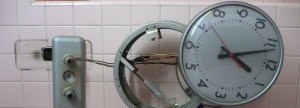If you want more time to write, the first thing you should do is to stop whining about it.
Think about how many times you’ve said something like “I wish there was more time in the day,” or “I’ll start writing during television reruns.” Now add up all of those moments throughout the year, and you probably have enough time to write a novel … maybe a crappy, whiny novel, but a novel nonetheless.
1. Stop Whining and Make Time to Write
You aren’t the first would-be writer to struggle with finding time to hone your craft. Even famous authors had to juggle relationships, writing, and jobs that paid real money. The difference between them and people sitting in a movie theater dreaming of becoming a writer is that they made time to write.
If you look at the lives of professional authors, very few of them had to abandon their families or jobs in order to write. Somehow, they made it work, and still had rich and meaningful lives. You can, too. Just stop whining … don’t waste precious moments that you could be writing instead.
“You don’t find time to write. You make time. It’s my job.”
~ Nora Roberts
2. Identify What’s Holding You Back
Once you have stopped whining, take a good look at what keeps you from having enough time to write. Track your schedule for a couple of weeks to see how you spend your days. Look for “time sinks,” activities that keep you busy but aren’t essential, things like Facebook and Twitter, or chatting for two hours with your neighbor each morning. Every writer struggles to find time to write, but the solution is different for each person.
3. Decide When You Do Your Best Writing
When are you most creative during the day? When do you have the most energy to write? If you struggle to think late at night, get up an hour earlier each day. If you can’t get your writing brain started until after sundown, make some time to write after everyone else has gone to bed. It’s important to find what works for you.
4. Block Off Time On Your Calendar To Write
Once you have identified the best times to write, be creative, or read (yes, reading is an essential part of being a writer), mark it on your schedule. Use a permanent marker (unless your calendar is electronic) to remind yourself that this time is sacred. Be consistent. It’s better to write one hour a day than to write eight hours every few weeks.
“If you don’t have the time to read, you don’t have the time (or the tools) to write.”
~ Stephen King
5. Treat Writing Like a Job
If you showed up late every day for your job, or decided to play on the Internet instead of working, how long do you think it would take before you were fired? After you have blocked off writing time on your calendar, stick to it. Show up on time, get to work right away, and work the entire time. Intention is a big part of writing, so write even when you don’t feel inspired. If you need to, put a picture of your “boss” on the wall nearby to keep you focused. When your neighbor starts to chat in the morning, you can always say, “I’m sorry, I have to get to work.”
6. Be Efficient
Start eliminating the “time sinks” that distract you from writing. If you want to stay on Facebook or Twitter, schedule time for them rather than doing it whenever you are bored. You can do the same with your family and friends. Be careful about being sucked into other projects or activities when you should be writing. You can also become more efficient. Lump your errands into one trip rather than spreading them throughout the week. Look for other ways to create more space during your day.
7. Fill the Spaces With Writing
You don’t have to write only during your scheduled writing times. Carry a notebook with you so you are ready to write whenever you have a few moments of quiet. Keep books in your backpack, purse, or car so you can read on the go. Writing should be like breathing … something you do all day long.
“You have to protect your writing time.
You have to protect it to the death.”
~ William Goldman
 __________
__________
Photo: Some rights reserved by Michael Cory


